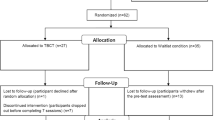Abstract
Empirical studies of the behavioral or cognitive—behavioral treatment of social phobia have appeared with increasing frequency over the last decade, and there is reason for cautious optimism in the evaluation of treatment effectiveness. However, few studies have reported systematic followup data, and there is little information available about the durability of change in treated social phobics. We report on the followup evaluation of cognitive—behavioral group therapy (CBGT) for social phobia. Patients who received CBGT or a credible alternative treatment were recontacted after a period of 4.5 to 6.25 years and completed a battery of self-report questionnaires, an individualized behavioral test, and a structured interview with an independent assessor. Patients who received CBGT remained more improved than alternative treatment patients on measures from all assessment modalities. However, due to the long followup period, only a portion of the original study sample could be assessed, and these patients may have been less severely impaired than patients who did not participate in the long-term followup. Limitations of the current study and issues of sample attrition in the conduct of long-term followup studies are discussed.
Similar content being viewed by others
References
American Psychiatric Association. (1980).Diagnostic and statistical manual of mental disorders (3rd ed.). Washington, DC: Author.
Barlow, D. H. (1985). The dimensions of anxiety disorders. In A. H. Tuma & J. D. Maser (Eds.),Anxiety and the anxiety disorders (pp. 479–500). Hillsdale, NJ: Erlbaum.
Beck, A. T., Ward, C. H., Mendelson, M., Mock, J., & Erbaugh, J. (1961). An inventory for measuring depression.Archives of General Psychiatry, 4 561–571.
Borkovec, T. D., & Nau, S. D. (1972). Credibility of analogue therapy rationales.Journal of Behavior Therapy and Experimental Psychiatry, 3 257–260.
Bruch, M. A., Heimberg, R. G., & Hope, D. A. (1991). States of mind model and cognitive change in treated social phobics.Cognitive Therapy and Research, 15 429–441.
Cacioppo, J. T., Glass, C. R., & Merluzzi, T. V. (1979). Self-statements and self-evaluations: A cognitive-response analysis of heterosocial anxiety.Cognitive Therapy and Research, 3 249–262.
DiNardo, P. A., O'Brien, G. T., Barlow, D. H., Waddell, M. T., & Blanchard, E. B. (1983). Reliability of DSM-III anxiety disorder categories using a new structured interview.Archives of General Psychiatry, 40 1070–1074.
Heimberg, R. G. (1988). The Social Avoidance and Distress Scale and the Fear of Negative Evaluation Scale. In M. Hersen & A. S. Bellack (Eds.),Dictionary of behavioral assessment techniques (pp. 425–427). New York: Pergamon Press.
Heimberg, R. G. (1989). Cognitive and behavioral treatments for social phobia: A critical analysis.Clinical Psychology Review, 9 107–128.
Heimberg, R. G. (1990). Cognitive behavior therapy for social phobia. In A. S. Bellack & M. Hersen (Eds.),Comparative handbook of treatments for adult disorders (pp. 203–218). New York: Wiley.
Heimberg, R. G., Becker, R. E., Goldfinger, K., & Vermilyea, J. A. (1985). Treatment of social phobia by exposure, cognitive restructuring and homework assignments.Journal of Nervous and Mental Disease, 173 236–245.
Heimberg, R. G., Dodge, C. S., Hope, D. A., Kennedy, C. R., Zollo, L. J., & Becker, R. E. (1990). Cognitive behavioral group treatment for social phobia: Comparison to a credible placebo control.Cognitive Therapy and Research, 14 1–23.
Holt, C. S., & Heimberg, R. G. (1990). The Reaction to Treatment Questionnaire: Measuring treatment credibility and outcome expectations.The Behavior Therapist, 13 213–214.
Hope, D. A., & Heimberg, R. G. (1990). Dating anxiety. In H. Leitenberg (Ed.),Handbook of social and evaluative anxiety (pp. 217–246). New York: Plenum Press.
Hope, D. A., & Heimberg, R. G. (in press). Social phobia. In C. Last & M. Hersen (Eds.),Adult behavior therapy casebook. New York: Plenum Press.
Kendall, P. C., Hollon, S. D., Beck, A. T., Hammen, C. L., & Ingram, R. E. (1987). Issues and recommendations regarding use of the Beck Depression Inventory.Cognitive Therapy and Research, 11 289–299.
Liebowitz, M. R., Gorman, J. M., Fyer, A. J., & Klein, D. F. (1985). Social phobia: Review of a neglected anxiety disorder.Archives of General Psychiatry, 42 729–736.
Marks, I. M., & Mathews, A. M. (1979). Brief standard self-rating for phobic patients.Behaviour Research and Therapy, 17 263–267.
Mersch, P. P. A., Emmelkamp, P. M. G., and Lips, C. (1991). Social phobia: Individual response patterns and the long-term effects of cognitive and behavioral interventions. A follow-up study.Behaviour Research and Therapy, 29 357–362.
Mizes, J. S., & Crawford, J. (1986). Normative values on the Marks and Mathews Fear Questionnaire: A comparison as a function of age and sex.Journal of Psychopathology and Behavioral Assessment, 8 253–262.
Paul, G. L. (1966).Insight vs. desensitization psychotherapy. Stanford CA: Stanford University Press.
Stravynski, A. (1983). Behavioral treatment of psychogenic vomiting in the context of social phobia.Journal of Nervous and Mental Disease, 171 448–451.
Watson, D., & Friend, R. (1969). Measurement of social-evaluative anxiety.Journal of Consulting and Clinical Psychology, 33 448–457.
Winer, B. J. (1971).Statistical principles in experimental design (2nd ed.). New York: McGraw-Hill.
Wlazlo, Z., Schroeder-Hartwig, K., Hand, I., Kaiser, G., & Munchau, N. (1990). Exposurein vivo vs. social skills training for social phobia: Long-term outcome and differential effects.Behaviour Research and Therapy, 28 181–193.
Author information
Authors and Affiliations
Rights and permissions
About this article
Cite this article
Heimberg, R.G., Salzman, D.G., Holt, C.S. et al. Cognitive—behavioral group treatment for social phobia: Effectiveness at five-year followup. Cogn Ther Res 17, 325–339 (1993). https://doi.org/10.1007/BF01177658
Issue Date:
DOI: https://doi.org/10.1007/BF01177658




